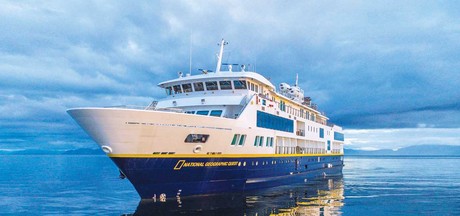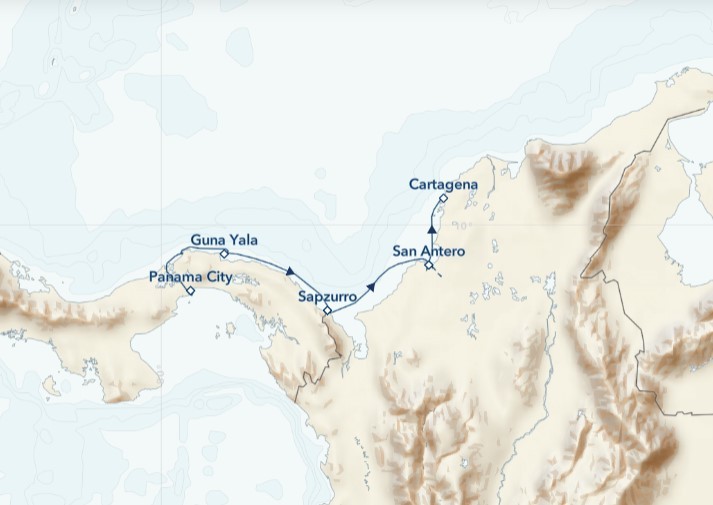
Discover an astonishing trove of natural and cultural treasures as you navigate the Caribbean coast of Panama and Colombia aboard the National Geographic Quest. Hike into dense rainforests that harbor extraordinary biodiversity, glide through little-explored inlets by Zodiac and kayak, and meet the indigenous inhabitants of a secluded Panamanian archipelago where age-old traditions remain part of everyday life. Experience the diverse heritage of stunning cities and remote towns off the beaten path, from the Arab-influenced architecture of Colombia’s Santa Cruz de Lorica to the bustling shores of Santa Cruz del Islote—the most densely populated island in the world.
- Transit the Panama Canal over two days to see it by day and in the coolness of night—plus an exclusive stop at the Smithsonian Research Institute on Barro Colorado Island
- Visit the palm-shaded Panamanian archipelago of Guna Yala (formerly San Blas Islands), an autonomous province that is home to the indigenous Guna people, and get immersed in local culture
- Discover the coastal treasures and remote wilderness of Colombia, exploring vibrant villages, pristine beaches, and wildlife-rich jungles
- Explore Colombia’s rainforests, among the most biodiverse on Earth, with almost 1,900 bird species and an astonishing list of approximately 450 mammals
Prices quoted here are often dependent on currency fluctuations. Please check with (01432 507450 or info@small-cruise-ships.com) for the very latest price, which may well be cheaper than the one advertised here.





Prices quoted here are often dependent on currency fluctuations. Please check with (01432 507450 or info@small-cruise-ships.com) for the very latest price, which may well be cheaper than the one advertised here.

Prices quoted here are often dependent on currency fluctuations. Please check with (01432 507450 or info@small-cruise-ships.com) for the very latest price, which may well be cheaper than the one advertised here.





Prices quoted here are often dependent on currency fluctuations. Please check with (01432 507450 or info@small-cruise-ships.com) for the very latest price, which may well be cheaper than the one advertised here.





Prices quoted here are often dependent on currency fluctuations. Please check with (01432 507450 or info@small-cruise-ships.com) for the very latest price, which may well be cheaper than the one advertised here.





Prices quoted here are often dependent on currency fluctuations. Please check with (01432 507450 or info@small-cruise-ships.com) for the very latest price, which may well be cheaper than the one advertised here.

Prices quoted here are often dependent on currency fluctuations. Please check with (01432 507450 or info@small-cruise-ships.com) for the very latest price, which may well be cheaper than the one advertised here.

Prices quoted here are often dependent on currency fluctuations. Please check with (01432 507450 or info@small-cruise-ships.com) for the very latest price, which may well be cheaper than the one advertised here.

Prices quoted here are often dependent on currency fluctuations. Please check with (01432 507450 or info@small-cruise-ships.com) for the very latest price, which may well be cheaper than the one advertised here.

Prices quoted here are often dependent on currency fluctuations. Please check with (01432 507450 or info@small-cruise-ships.com) for the very latest price, which may well be cheaper than the one advertised here.

Upon arrival in Panama City, transfer to the port in Fuerte Amador and embark our ship. (D)
By special permission, our ship anchors overnight in Gatún Lake, a vast artificial lake that forms a major part of the Panama Canal. In the morning, disembark on Barro Colorado, a hilltop transformed into an island by the damming of the Chagres River to build the Panama Canal. Visit the Smithsonian Tropical Research Institute and learn about initiatives to protect the incredible biodiversity of the surrounding Barro Colorado Nature Monument, one of the most studied areas of tropical forest on the planet and the site of various National Geographic–supported studies. Later, choose to hike into the jungle, navigate the lake by Zodiac, or take a boat ride to the mouth of the Chagres River to explore the Panama Rainforest Discovery Center. Tonight, cruise onward through the complex lock system of the Panama Canal, taking advantage of the nighttime lull in cargo activity. Completed in 1914, the canal is about 50 miles long and sees some 14,000 ships pass through every year. Witness this astonishing feat of engineering under the dramatic golden glow of floodlights. (B,L,D)
This morning, we arrive along Panama’s Caribbean coast and step ashore at the historic town of Portobelo. Named by Cristopher Columbus in 1502, Portobelo, or “beautiful port,” was one of the most important Spanish trading centers in the New World. Explore the town’s 17th- and 18th-century Spanish colonial fortifications, designated a UNESCO World Heritage site. Later, hike into Portobelo’s lush jungles in search of mantled howler monkeys, toucans, and a variety of parrots. In the afternoon, our ship sails further down the Panamanian coast, where we’ll set out with snorkel and fins to explore the vibrant undersea world of the Caribbean. (B,L,D)
Wake up amid the archipelago of Guna Yala (also known as the San Blas islands), a constellation of 368 tiny, white-sand isles scattered off the northeast coast of Panama. Get to know the indigenous Guna people, one of the first native groups to achieve political autonomy in Latin America. Spend the morning among the thatched huts of an island village, learning about Guna culture and handicrafts. Marvel at the intricate designs of handmade textiles called molas, which harken back to a female tradition of body painting. In the afternoon, explore the vibrant marine world around the islands by snorkel, kayak, and stand- up paddleboard. (B,L,D)
Discover the little-explored coastal community of Necoclí and the surrounding region. Our exploration begins with Zodiac excursions into lagoons fringed by mangroves, part of a protected coastal wetlands area. Keep an eye out for wildlife, including a variety of colorful bird species such as great and snowy egrets and Amazon and green kingfishers. After lunch, visit a local cocoa farm, where residents are striving to incorporate the UN’s Sustainable Development Goals into their agricultural community. (B,L,D)
Santa Cruz del Islote is one of the most densely populated islands on Earth, where some 600 inhabitants live squeezed together in an area the size of two soccer fields, surrounded by turquoise seas and coral reefs. Stroll the island’s motor-free streets, past brightly painted houses and bustling docks; and experience daily life on this unusual island as you chat with local residents. Later, as we enjoy lunch on-board, we cruise through the San Bernardo archipelago calling at San Antero. Our afternoon excursion takes us to Tuchín, an indigenous village celebrated as the birthplace of the sombrero vueltiao, a type of hat considered a national symbol of Colombia. Observe vueltiao makers at work, and then meet with members of the local Zenú community, known for their ingenious irrigation systems. Return to National Geographic Quest, which will stay at anchor tonight in San Antero. (B,L,D)
Disembark this morning for our short drive to Santa Cruz de Lorica, a charming riverside town influenced by several waves of immigration from France, Belgium, England, Syria, and Lebanon. Stroll through the central square, overlooked by a stunning Spanish-colonial cathedral and historic buildings in colorful Arabic styles. Return to the ship for lunch and time to relax before embarking on a late afternoon cruise in the rarely explored Cispatá Bay, timed for optimum wildlife spotting as native creatures emerge from their mid-day rest. (B,L,D)
After breakfast on board, disembark in Cartagena and transfer to the airport to connect with your flight home. (B)
Itineraries are subject to change
National Geographic Quest

| Built | 2016 |
|---|---|
| Max passengers | 100 |
National Geographic Quest is a state-of-the-art, purpose-built expedition vessel made for exploring coastal waters, shallow coves, and fast-moving channels where wildlife congregate while sailing with the luxury of supreme comfort. Spacious cabins, open decks for wildlife viewing, and specialty tools for exploration make it the ideal platform for sailing in the remote areas of Alaska, the Pacific Northwest, Costa Rica, Panama, and Belize.
Designed with decades of expedition experience in the region, National Geographic Quest more than comfortably accommodates 100 guests in 50 cabins. Her twin expedition craft landing platform allow us to rapidly get on and off the ship to take advantage of wildlife sightings and to ensure we maximize our time off the ship exploring. Created with a shallow draft, Quest draws only nine feet of water allowing her to sail into places where much larger ships cannot go.


